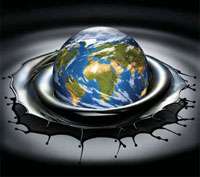Global economy may drown in black gold
By Hiren Doshi

The G8 summits were formed as a response to rising oil prices in the mid seventies. It was not until 2000 that the environment was included in the agenda. Serious discussion around it started only in 2005 when climate change was identified as one of the priorities of the summit in Scotland (albeit the outcome came quite short of expectations). At a climate change conference in Bali last December, all G8 countries except the US pledged to cut emissions by 25% to 40% from the 1990 levels by 2020.
On July 8, the G8 leaders agreed on a 'Document on Environment and Climate Change'. The leaders of the G8 agreed to share with the members of the UNFCCC the vision of achieving a goal of at least 50% reduction of global emissions by 2050. The G8 stated that achieving the ultimate objective of the UNFCCC will only be possible through common determination of all major economies. It was acknowledged that participation from China, India, Brazil, Mexico and South Africa is critical to a Climate deal that would take effect when the first phase of the Kyoto Protocol expires in 2012.
China and India flatly refused to the goals citing reasons that energy security and economic growth are equally important for developing countries and no climate change goals can be formulated in isolation. Their argument was the G8 countries are responsible for much of the emission that has pushed the world into major environmental catastrophe and they should do more to rectify the damage. Over 80% of the emissions in the atmosphere today have been caused by the G8. Although the G8 is home to only 13% of the global population, it emits more than 40% of global carbon dioxide. The US comprises around 4% of world population, constitutes 26% of world GDP and consumes 26% of global energy supply.
The increase in oil prices clearly affected this year’s discussion, playing a critical factor in the G8’s adoption of a climate declaration which the environmentalists have condemned as too lax and vague. The agreement reflected a consensus that any pronouncement on climate change has to take into consideration the state of the global economy and energy security concerns of developing nations.
Oil prices have increased by 1,400% in the last decade and have now reached a level that is threatening to drag global economy to a grinding halt. This era in effect has come to be the third oil shock that the world has seen since 1970. During the first oil shock, oil prices had almost quadrupled from $3.5pb to $13.5pb between 1973 and 1975. During the second oil shock, the price jumped by more than 100% from $15pb to $39pb. In the current phase, oil prices have increased from $55 a barrel since early 2007 to current levels of $130 a barrel.
The US and other developed countries attributes this rise in oil prices to the fact that the global oil supply by producing nations has not been able to keep pace with ever increasing demand from consuming nations, more so the emerging countries like India and China. The counter argument to that theory is that rather than fundamentals, massive amount of speculative activities is mainly responsible for the recent hike in not only oil price but also commodity prices across the board. If the later is true, the bubble has to burst some day and we will live to see oil price come down to sane levels. A closer look at data suggests that this might just be the case.
Michael Masters, a US-based hedge fund manager, suggested a month back to the distinguished members of the US senate committee on homeland security and governmental affairs that speculative demand is behind much of the recent rise in commodity prices and the US lawmakers must curb speculators’ access to commodities if commodity inflation has to be brought under control.
The same view was again emphasized in the recently concluded Jeddah conference of oil producers and consumers. King Abdullah stated in no uncertain terms that the speculators are clearly behind the sharp rise in the oil price, which is estimated to have contributed to up to 60% of the increase. The rest of OPEC's members echoed his view but this was in stark contrast to the argument put forth by the US and Germany that the inability of OPEC to increase the supply in response to the fundamental rise in demand for oil is the real cause for much of the recent spike in oil prices.
Click here to read the full text of the article
Source: Seeking Alpha
Subscribe to Pravda.Ru Telegram channel, Facebook, RSS!


